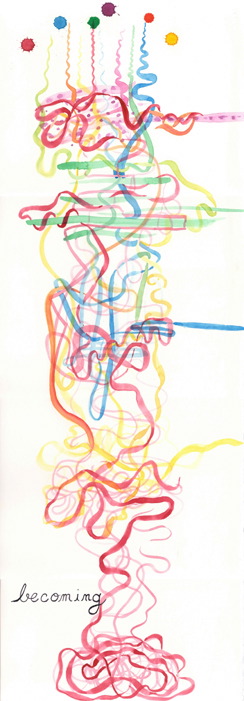
Dialogue and Dissemination:
A Conversation about Change Continues
Story EvolutionDalke/PBurgmayer
A dialogue triggered by Grobstein's
Writing Descartes ...

 |
Dialogue and Dissemination:
Story Evolution |  |
Paul picked up a thread from an earlier conversation between him, Anne, Sharon Burgmayer and Cassandra Fraser:
Now you have me going....
Responding specifically to what you wrote, the only "ugh" I felt while
reading was the comment about conversation with an intent of "changing
a culture." I am not sure why this happened. I will think about this more.
I...thought about a book that has fascinated me for a while called Speaking Into the Air: A History of the Idea of Communication (by John Durham Peters, 1999).... I would posit that the tension between dialog and dissemination lies at the heart of what you wrote about the Web conversations. I wonder if a Web conversation around this on Serendip might be useful. I excerpt the core of Peters' position below:
In staging a debate between the greatest proponent of dialog, Socrates, and the most enduring voice for dissemination, Jesus...Socrates sees writing as troubling delivery and cultivation: his vision is sender oriented. The question for him is the care of the seeds and their proper nurturing, not what the recipient might add to the process. Jesus, in contrast, offers a receiver-oriented model in which the sender has no control over the harvest.
Anne:
I sure like the SOUND of the Peters' book, Speaking into the Air--
a propos web talking, eh? And I think his notion that we should take care in insisting on the sort of dialogue which requires reciprocity (if that reciprocity is understood as the receiver being changed in a certain way/certain direction by what the sender says) is very acute, an excellent caution/reservation to keep in mind amid all the valorization of "dialogue." But I do not at all agree w/ Peters' claim that the "alternative normative model" needed for discourse in large-scale democracy is what he calls "nonreciprocal" forms of talking. I am very drawn to the notion that we need a way of speaking that frees us from the script of a particular expected response (which I'd call colonization, oppression....). But we cannot, if we are to be reponsible citizens in a democracy, be freed of the expectation that we will be changed (in some non-prescriptive) way by listening, really listening, to the stories of others.As Peters says, there needs to be a "necessary looseness" in any communicative coupling; but there has to be some sort of--you're the chemist here--docking, yes?
August 2, 2004
Paul:What intrigued me most about Peters' description of dialogue vs. dissemination was not the attitude of the receiver, but that of the speaker. Dialogue for Socrates a means to control the conversation. Dissemination for Jesus was a letting go of the words (parables being great examples of this). I had never thought of them in this way before reading the book. Dialogue has always been the ideal for me. Does that change your perspective?
Anne:
Yes, you might indeed sense a "little movement" (grin) here.
Apologies if my earlier response sounded cryptic. What I meant was the sort of thing being described just now on the forum as "story-sharing": valuing, even encouraging stories to rub against one another, believing in the worth of their differences.
I guess my focus now is less on what the sender intends (controlling the conversation or letting go of the words) but more on what the receiver does with what she gets: the use she can make of the words, irrespective of the author's desire for power over her thinking...Like you, having heard Peters' distinction, I very much prefer the "freely offered gift" of the mode of dissemination over the "controlling" quality of dialogue as he describes it...But: there's something really important to me about the change that can happen in exchanges like these, so I'm wanting to claim a kind of "disseminative dialogue"--one that doesn't expect a particular, directive change (i.e. you'll come to share my belief), but one that is always open to being changed by what one hears. And I do think that this series of dialogues is stumbling towards--sometimes even exemplifying--that sort of undirected, exploratory dialogue.
So (of course) now I'm wondering about what sounds to me like the dissonance/disjunction between your so-articulate desire to "change" the one w/ whom you talk, and the "ugh" you felt while reading my phrase "changing the culture"--does it have to do w/ the LEVEL at which change makes the most sense for you? Your optimism and openness to the possibility of individual change? Your pessimism about and resistance to the possibility of social change?
Paul:
I have no faith that culture is amendable to change (deliberate,
human-induced). Perhaps its the term "culture." It seems to me these
days the web and 24 hour news provides us with a better and better
understanding that grasping a notion of "culture" is a Sisyphean task.
Culture where? Wayne? Main Line? Northeast? US? Northern
Hemisphere? Western world? It is very much a human (non-knowing)
sort of affair open to great debate. So a deliberate attempt to change what
probably by nature is undefinable, therefore for me leads to a big ugh?
Perhaps another story might help. In my old job, every year at the time
when research plans were being made, the idea of "Novel Condensate
Treatment" would be on the marketing folks list. Doesn't matter what the
terms means, they wanted "cheaper, better, more marketable, but not
hard to apply." This was a similar sort of Sisyphean task that makes a
researcher groan "And how many 10's of thousand hours will you let us
have to do this?" After 10 years of hearing this, it got to be a joke that I
could laugh at. But it took ten years to get past my yearly big "ugh."
The "ugh" also probably says something about me. I am not a "save the
world" kind of person. I am very much a one-on-one person so that's what
I am drawn to.
Response to "ugh."